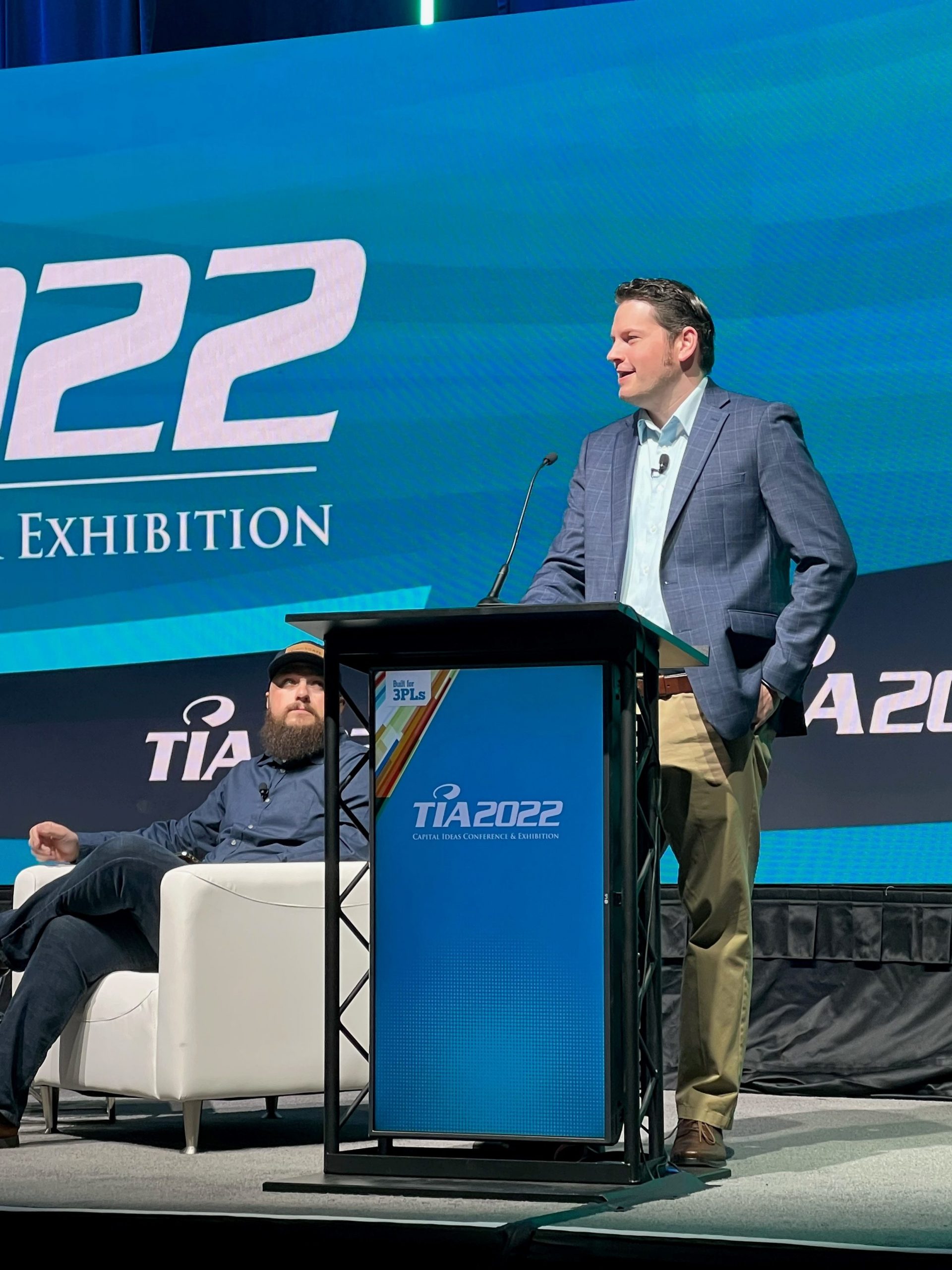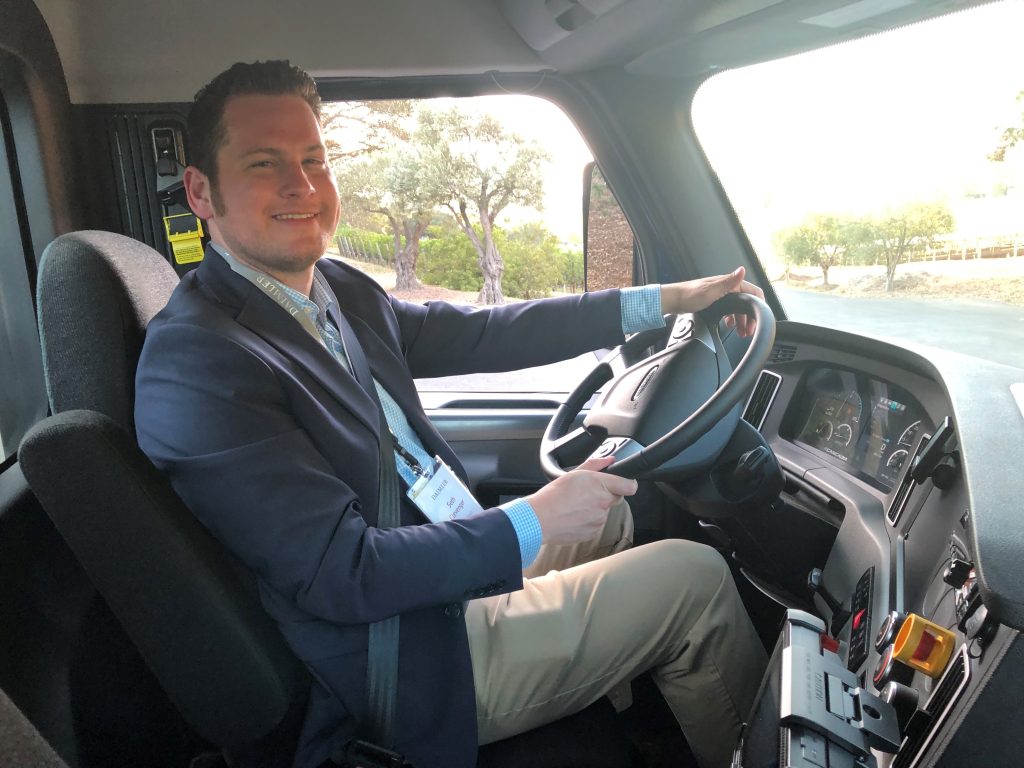901 Tower Drive • Suite 420 •
Troy, Michigan 48098
• P: 248.269.1122 •
E: bianchipr@bianchipr.com
901 Tower Drive • Suite 420 •
Troy, Michigan 48098
• P: 248.269.1122 •
E: bianchipr@bianchipr.com

I’m Seth Clevenger, managing editor for features at Transport Topics, a weekly newspaper and multimedia outlet dedicated to covering trucking and the freight transportation industry.
In my current role, I plan, write and edit industry news stories and oversee a range of regular features and special projects, including weekly longform feature stories in our flagship newspaper and on TTNews.com. I also produce audio and video content for our online and multimedia channels.
One of my core responsibilities is producing TT’s annual Top 100 lists of the industry’s largest trucking and logistics companies. I also manage TT’s quarterly iTECH magazine, which specializes in information technology in the trucking industry, and produce special reports on a variety of topics such as electric-powered trucks. In addition, I co-host TT’s biweekly RoadSigns podcast with my colleague, Michael Freeze.
Can you tell us what types of stories, trends or issues are on your radar now?
In recent years, I have spent a great deal of time covering the emergence of new commercial vehicle powertrain technologies such as battery-electric and hydrogen fuel cell trucks, as well as internal combustion engines that run on cleaner and renewable fuels.
This is largely uncharted territory for an industry that has been fueled almost entirely by diesel for generations. In the coming years and decades, fleet operators will be able to choose from a much broader menu of powertrain options to meet the requirements of their operations and comply with emissions regulations. We’ve already seen that early adopters face a steep learning curve and will need to overcome many obstacles along the way.
Looking to the recent past, we closely followed the disruptions and supply chain shortages inflicted by the coronavirus pandemic and the subsequent freight boom as the economy rebounded. The freight market has since cooled and disruptions have eased, but the experiences of the pandemic continue to influence the transportation industry.
Describe the craziest or most fun story you have worked on.

Rather than highlighting a specific story, I’ll just mention that business travel is one of the best parts of my job. I really enjoy attending all sorts of industry trade shows and conferences all over the country and even in other parts of the world. Along the way, I’ve experienced emerging technologies firsthand while sitting in the cab of a self-driving truck or behind the wheel of an electric-powered truck. So many of my best story ideas are sparked by what I see and experience at industry events.
What story or stories are you most proud of?
For the past seven years or so, I have closely covered the development of automated driving technology and the potential business cases for autonomous trucking. This topic has generated enormous hype along with some strong reactions within the industry, sometimes driven by misconceptions about what this technology will mean for professional truck drivers.
I like to think that my work on this subject has helped guide the industry toward a more realistic and nuanced understanding of how autonomous trucks could fit into real-world freight operations. From my extensive conversations with technology developers and industry stakeholders, it is clear that autonomous trucks would complement the industry’s workforce rather than replacing it. That’s because driverless trucks will be designed to operate on specific freight lanes that are well suited to automation and will scale up gradually over many years, while human drivers continue to handle more complex driving environments. In fact, autonomous trucks could eventually enable the trucking industry to shift more driving jobs toward shorthaul and regional routes that experience less driver turnover than longhaul jobs. The notion that autonomous trucks are an imminent threat to drivers’ jobs just doesn’t reflect reality. I am confident when I say that a 21-year-old who obtains a CDL today and becomes a safe, reliable driver will be able to spend his or her entire career behind the wheel if that’s what they want to do.
What elements or characteristics do you look for in a story, and why?
Transport Topics is a business-to-business publication that exists to provide our readers with business intelligence and insights that can help them run their organizations more effectively and better plan for the future. The majority of our readers are decision makers and managers at motor carriers, logistics companies, shippers, manufacturers, suppliers and other industry participants. It’s my responsibility to help them understand the key issues and trends within the trucking industry and arm them with the information they need to guide their businesses through regulatory changes, emerging technologies and shifting business practices. That responsibility is always top of mind when I evaluate the news value of potential stories.
How long have you been in journalism and how did you get started?
I decided to pursue a career in journalism toward the end of my freshman year at Miami University in Oxford, Ohio. During my college years I contributed stories to the student newspaper and interned at a couple local news outlets in southwest Ohio before graduating with my bachelor’s in English-Journalism in 2005. Later that year I moved to Smyrna, Delaware, for my first full-time journalism job at a local newspaper that was part of a small family-owned chain at the time. After about six years of covering town council and school board meetings, local business and sports, I accepted a position at Transport Topics in 2011 and relocated to the greater Washington, D.C. area.
Finish this sentence: If I am not reporting, I am …
Most likely reading children’s books to my 2-year-old daughter or catching a flight to the next trade show I’m covering.

What advice do you have for PR people that want to pitch you?
Know your audience. I often receive pitches that make it painfully clear that the PR agent has little to no understanding of Transport Topics or its readers.
Also, do your best to build rapport with the editors and reporters covering relevant beats. In my experience, turnover rates at PR agencies tend to be very high so it can be difficult to build much of a relationship before a new person steps into that role. That being said, PR experts who remain in the same industry and represent the same clients for many years stand out from the crowd due to their industry knowledge and connections. There’s also more comfort and trust working with someone you’ve come to know over the years as opposed to a first-time conversation or email with someone you’ve never met face to face. That works both ways.
Any pet peeves with PR people?
If you pitch an interview and I accept the offer, please do everything you can to ensure that the person or company you represent follows through with that interview. This can be outside of your control, but it is very frustrating to schedule an interview through a PR/media relations representative only for that offer to be withdrawn while I’m on deadline due to a last-minute change in plans or scheduling.
Also, always take a moment to double check name spellings before you hit send on an email. We all make mistakes, but I am amazed at how often I receive emails addressed to “Scott” or “Sean.” I don’t mind seeing my name mangled in amusing ways on my Starbucks order, but it’s bad form coming from a PR professional.
Tell us a little about yourself (family, interests, hobbies, background, etc.)
I was raised on a small family farm in northwest Ohio. I had no desire to become a farmer myself, but looking back I can see how those farm chores helped instill a strong work ethic and a greater appreciation for the type of work I do now.
I currently live in Alexandria, Virginia, with my wife and daughter. We spend a lot of time at local parks and enjoying the sights and food in Old Town Alexandria.
Is there anything else you’d like to share with our audience? (Maybe something that would surprise people?)
I love heavy metal music, especially the segments of the genre that trace their lineage to the NWOBHM sound of Judas Priest and Iron Maiden. I typically write my stories while listening to groups like Gamma Ray, Symphony X, Cirith Ungol, Blind Guardian, Helion Prime, Crystal Viper or my favorite D.C.-area locals, A Sound of Thunder. I love continuously discovering new music.
You can follow Seth and Transport Topics on X:
Check out some of Seth’s recent articles:
You might also be interested in: